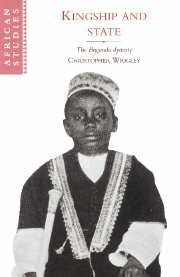Book contents
- Frontmatter
- Contents
- List of illustrations
- Preface
- Notes on language
- List of abbreviations
- 1 Preamble
- 2 The story and its making
- 3 Introduction to myth
- 4 Introduction to Buganda
- 5 The remoter past
- 6 Genesis
- 7 The cycle of the kings
- 8 Fragments of history
- 9 Foreign affairs
- 10 The making of the state
- 11 Reflections
- Notes
- Bibliography
- Index
- Other books in the series
9 - Foreign affairs
Published online by Cambridge University Press: 12 January 2010
- Frontmatter
- Contents
- List of illustrations
- Preface
- Notes on language
- List of abbreviations
- 1 Preamble
- 2 The story and its making
- 3 Introduction to myth
- 4 Introduction to Buganda
- 5 The remoter past
- 6 Genesis
- 7 The cycle of the kings
- 8 Fragments of history
- 9 Foreign affairs
- 10 The making of the state
- 11 Reflections
- Notes
- Bibliography
- Index
- Other books in the series
Summary
The enemy kingdom
One of the popular topographical legends in Buganda features a character called Kkungu, who decided that he would like to be king and so set off for Bunyoro to get himself appointed. But when he got as far as the home of Kibaale, chief of the Oribi Antelope clan, about a dozen miles north of Kampala, he began to feel tired and was tempted to take a couple of days' rest. The delay was fatal, for the (unnamed) reigning kabaka got wind of the plot and took steps to foil it. There was then nothing for Kkungu to do but turn into the rocky hill (a standard difficult climb, according to a colonial enthusiast) that now bears his name. K-kungu (from i-kungu) is a depersonalised form of the word mu-kungu, ‘chief’; and by a neat inversion Ki-baale, the name of the chief who resides at the foot of the hill, is a personifying form of i-baale or m-baale, an old word for ‘rock’.
The story was of course a joke about procrastination: “I might as well stop here for the week-end”, he said, and there he is still!’ Sometimes it was told simply as such, without any political content. Its interest for us, however, is the plain assumption that the way to become the kabaka of Buganda was to seek authority from Bunyoro. In fact the name Kkungu probably contains a punning allusion to prince Kakungulu, brother of Kamaanya (G.3), who did seek and win Nyoro support in his bid for the Ganda throne, though it proved unavailing.
- Type
- Chapter
- Information
- Kingship and StateThe Buganda Dynasty, pp. 192 - 206Publisher: Cambridge University PressPrint publication year: 1996

